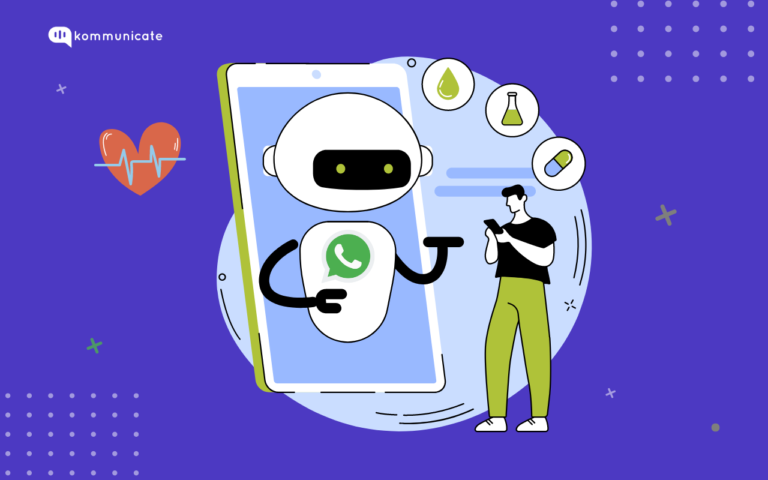There is no other business in the world where time is more important in preserving lives than the healthcare industry. Individuals’ health and well-being can be improved by providing timely healthcare. In today’s world, when pandemics and rapid outbreaks of flu are common, the healthcare business requires a technology boost to compete.
Having stated that, the sector is already utilizing a variety of technology applications. However, the newest generation of instant messaging apps, such as WhatsApp, can go a long way toward supporting the business and its stakeholders. This may be accomplished by providing high-quality, time-sensitive services.

Chatbots in healthcare, such as WhatsApp, serve as a communication bridge between the two parties. This ensures that healthcare services are provided on schedule. WhatsApp can assist eliminate in-person visits, which typically drain physicians’ physical and mental resources.
According to the Israel Journal of Health Policy Research, online consultations have decreased the requirement for in-person sessions at least once a week for at least 96% of healthcare experts.
Medical chatbots can provide more than just the ability to reduce in-person appointments. It may also introduce a completely new method of consulting and providing healthcare services to the sector, therefore making the globe a safer and better place to live.
WhatsApp chatbots increase communication in the healthcare profession
1. Simplified appointment scheduling
Patients had to contact the doctor’s clinic/hospital to schedule an appointment before mobile applications and mHealth became prevalent. Any adjustments to these appointments were difficult to arrange and caused problems for both parties. In most situations, the patient or a bystander was also required to attend the hospital to make the necessary modifications. This was very difficult in most circumstances, resulting in missed appointments.
When the doctor’s schedule changed, the uninformed patient would show up for the appointment only to find out it had to be rescheduled. In a nutshell, life was difficult.
With mobile applications taking over and instant messaging apps like WhatsApp becoming the one-stop shop for all communication, such challenges are no longer an issue.

2. Responds to Frequently Asked Questions (FAQs) on a scale
Let’s be honest. Even when shopping online, we have hundreds of questions racing through our heads before making a purchase choice. The patient will have several queries regarding a healthcare decision. Some of them may be fundamental in nature, such as hospital wheelchair accessibility, insurance services, ambulance services, payment methods, and so on.
Most patients ask these questions again over time. These commonly asked questions do not require a doctor’s or a healthcare provider’s time and attention. You may create a WhatsApp chatbot to respond to similar questions in real-time

3. Communication concerning patient information in real-time
Doctors often work in shifts at most hospitals. This implies that a doctor will be present in the hospital for a particular working hour, after which another doctor will take their position. The patients allocated to the previous doctor will, however, continue to be watched by hospital staff.
Message applications can be used to send questions or communicate about the patient’s health state. Whatsapp chatbots make it simple to exchange soft copies of scan reports, photographs of wounds, and other information in real-time. Furthermore, because these chatbots are encrypted, data transfer is safe and resistant to cyber security risks.
4. Answers medical insurance questions
For every patient, obtaining health insurance is a difficult task. Because of the many plans and coverage given by various health insurance carriers, a patient may not comprehend the terminology right away. When the need to claim insurance occurs, clients frequently have to hurry to discover the agent’s contact information or wait interminably before they can reach a phone support agent.
Whatsapp chatbots can help in this case. They can function as a real-time support system, answering patients’ quick questions regarding health insurance coverage information. They can also serve as a conduit of communication between the insurance company and the insured. This preserves the conversation thread for future reference. Patients can now obtain real-time status updates on their claims and settlements using WhatsApp chatbots.

5. Payments for in-chat integration
WhatsApp has lately begun accepting in-chat payments. Users may now effortlessly perform financial transactions with others in their contacts thanks to this capability. While this functionality may appear to be a standard payment integration, it offers more benefits in the healthcare industry than meets the eye.
For example, the patient may have a single unified channel for initiating and completing financial transactions. Insurance payments and claims are also consolidated in one location to avoid overlap and communication breakdowns. It simplifies the procedure of obtaining and paying for healthcare.
Putting everything together
WhatsApp chatbots are relatively new to the market. They have made significant advances in a variety of areas, healthcare being one of them. Healthcare providers, medical professionals, and patients can have more control over their time and the services they deliver or receive thanks to WhatsApp chatbots’ real-time communication and collaboration capabilities.
WhatsApp chatbots establish a single communication channel via which you can easily exchange conversations, data, and even money. It lowers the complexity and difficulty that previous systems had, which were bringing the healthcare sector dangerously near to collapse. Chatbots reduce the need for specialized corporate software that most laypeople do not grasp.
It equalizes access to everyday healthcare for all people. Anyone who can use a smartphone may simply utilize a WhatsApp chatbot to manage their healthcare. Furthermore, there is no need to pay for the installation of extra software or apps. WhatsApp remains a free app for everyone.
It comes as no surprise that WhatsApp chatbots have significantly cut in-person booking times and waiting periods. They’ve made it simpler for physicians and patients alike to get on the same page thanks to real-time communication gaps.
